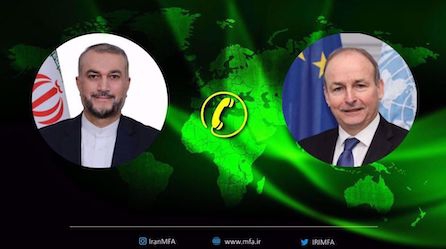Saturday 13 May 2023 - 00:10
Story Code : 406071
Ireland has no interest in making baseless judgments against IRGC
In a�a telephone conversation�with his Iranian counterpart�Hossein Amir-Abdollahian on Thursday, Martin said Ireland�recognizes Iran's significant role in the fight against terrorism.
He also appreciated a recent decision by Iran to release an Irish national on humanitarian grounds.
Amir-Abdollahian strongly condemned the Swedish parliament�s decision to blacklist the IRGC, saying that the move has been instigated by terrorists and anti-Iran individuals.
�This move has been engineered by terrorist elements and individuals disavowed by the Iranian nation,� he said.
He noted that the IRGC has played a major role in fighting terrorism, describing the force as �a sovereign institution.�
The top Iranian diplomat also emphasized that the IRGC �is responsible for safeguarding national and border security, and holds the paramount position in combating terrorism in the region.�
Amir-Abdollahian then pointed to the various areas of cooperation between�the Islamic Republic of Iran and the Republic of Ireland,�underscoring the need for seizing available opportunities in a way that could serve the interests of both countries.
Martin noted that his country is determined to further expand cooperation with Iran.
The Irish foreign minister then hailed Iran's cooperation with the International Atomic Energy Agency (IAEA), expressing Ireland's support for initiatives aimed at removal of anti-Iran sanctions.
He finally extended an invitation to Amir-Abdollahian to pay an official trip to Dublin, saying he hopes to visit Tehran in the near future.
The IRGC�was established on April 22, 1979, by the founder of the Islamic Republic Imam Khomeini as a paramilitary organization charged with protecting the newborn Islamic Republic.
The force closely cooperates with the Iranian Army to counter�foreign threats as manifested during the 8-year war imposed by former Iraqi dictator Saddam Hussein on Iran in the 1980s.
By Press TV
# Tags











